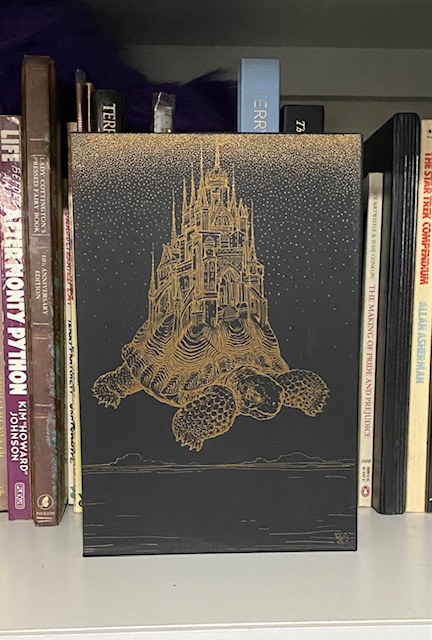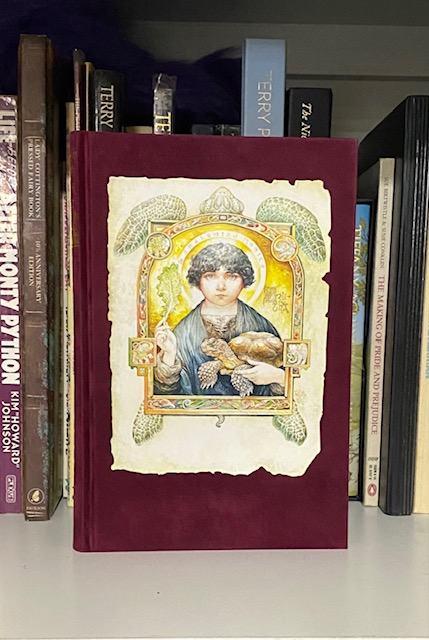There’s a phenomenon known as “capturing lightning in a bottle” that describes the sensation of being in a particular place at precisely the right time to take advantage of a situation that nobody really knew existed before.
In 1992, there was a bit of a renaissance for speculative fiction that we hadn’t seen since the late 1970s. Star Trek had made a triumphant return to the small screen in the form of The Next Generation in 1987, which was about to make the leap onto the big screen like its parent show had done. A spin-off, Deep Space Nine, was about to be launched and there were plans for a further spin-off show called Voyager. In other television news, Doctor Who was about to celebrate its 30th anniversary and The X-Files was about to launch a stupendously successful first season that would make conspiracy theories mainstream, for which I have yet to forgive it. Highlander – The Series was becoming a smash hit for fantasy viewers and there were many other projects that were rapidly greenlit for a great boom in fantastical television and film that we still haven’t really come down from.

In retrospect, it seems that the time was ripe for a fantasy novelist to make a similar splash.
Small Gods was the novel that broke Terry Pratchett into the literary mainstream. He was gradually becoming a bestseller and noticed by a lot of literary types but he had been pretty much ignored by them because he wrote fantasy, which was hardly serious literature at all…
… oh, except for the Narnia books, which any literary snob adored when they were a child…
… and The Lord Of The Rings, which had a similar immunity because it was such a unique thing that it transcended its fantastical roots and was practically literature…
… and the work of Angela Carter, who really only used fantasy as a vehicle for literary ideas, of course…
… and comi- sorry: graphic novels, which were starting to take off as acceptable literature courtesy of Watchmen and Maus…
The Discworld series was popular but it was hardly taken seriously because, well… it was comedy. And fantasy. And you couldn’t possibly take the idea of a world travelling through space on the back of a turtle seriously, could you?
Could you?
Despite the fact that very few of us did (then, at least), these reservations were held seriously by a lot of people. There had been inroads, of course: Equal Rites had broken ground as feminist literature, proving that fantasy wasn’t just for kids and manchildren; Wyrd Sisters had sown further seeds in that ground with a varied cast of female characters who managed to save the day.
As we all know, things in fantasy go in threes: it was the third bear’s porridge and bed that Goldilocks found “just right”; it was the third little pig that manage to foil the wolf’s culinary desires; it was the third Billy Goat Gruff that knocked the troll off the bridge – these things always happen in threes.
Small Gods took some ideas that had traditionally been the province of fantasy and literature – the existence of gods and the nature of belief – and explored them through the lens of Discworld.
It was ridiculously successful and brought Discworld properly into the mainstream.
Religion, it seemed, was a topic that made Discworld respectable.
At the time I was thrilled: there were a lot more people reading my favourite series and keeping it viable. However, a lot of reviewers were talking about fantasy as though it was some kind of “mirror” by which we can examine our own world. And they were saying this as though it was a new thought. As though it hadn’t been done since Plato’s Cave or Aesop‘s Fables or even before then.
Pratchett, I read in more than one review, was looking at how religion was abused by people in power and was using a fantasy setting to show just how ridiculous some aspects of organised religion were.
Forget that he had been commenting on religion since The Light Fantastic. Forget that there had been snipes at the abuse of power since The Colour Of Magic – this was something new! Nobody had ever written about religion in a comedic/fantastical way before, it seemed. Pratchett was being hailed as a serious satirist who spoke about things that other fantasy writers had never spoken about before…
It bothered me a lot to see the books I loved – the books I had been reading for almost a decade – so grimly misunderstood.
Not because people reviewing it were giving Sir Terry his due: that was lovely, frankly. My ire came about because Small Gods was being hailed as something new: a fantasy novel that was well-written and literary!
I should have been glad that they didn’t pull the “magical realism” card on it as well.
So, this meant that I now had to share something that had belonged to me and a comparatively small number of people with a much wider range of folks. Some of them would only stick around for this book, some of them might go for some of the earlier books and decide that future books might not be their thing, but many of them decided to stick around for the long haul.
This was a good thing, but I had a bit of a difficult relationship with this book for a long time afterwards. I knew it was stupid – resenting a book for being popular – but I often made up excuses for Small Gods in the years after it was published.
It wasn’t as funny, for one thing: the jokes weren’t as frequent as they had been in previous books. They were still hilarious, but they were often a little slower at revealing themselves. Like Mort, this one relied more heavily on plot and character and was a better novel for it.
It was difficult to place into the Discworld timeline, for another: the ending happens about a century after the beginning, but it’s hard to place the bulk of the story into some kind of placement within the other books (there are other fans who have managed to work out where it takes place, and their efforts are incredibly well-thought-out).
So what is it about, after this rather turgid stroll down my section of memory lane.
Well, Small Gods is the story of Brutha, a very junior monk worshipping the all-powerful God, Om. However, due to the vast expansion of the church of Omnianism, Om’s actual believers number… just one. Brutha is the solitary true believer in Om, with the result that the once omnipotent and omniscient deity can now only manifest himself in the form of a turtle. Coincidentally, the Church of Om – which is blatantly the Catholic Church without the window dressing that a lot of authors put into their fantasy religions – is currently at odds with a school of thought that believes that the world is being carried around on the back of four elephants on the back of a turtle swimming through space. The church is of the considered opinion that the universe makes more sense if the world is spherical. The catchphrase of these disc-worlders is “De chelonian mobile”: a Discworld version of Latin that translates as “the turtle moves.”
To further add to Pratchett’s utter genius and comic timing, the Catholic Church – in our world – formally apologised to Galileo not long after the publication of Small Gods, and admitted that they were wrong and he was right about the Earth not being the centre of the universe.

Reading the book thirty years after it was published – when science appears to be up for grabs for whomever can shout the loudest about how they feel about it (including the shape of the world we all live on) – one can only marvel at how prescient Pratchett was at showing us the naked greed and shameless lust for power that so many those in authority have. Except that it’s not prescience: just a pretty predictable story about how we often shuffle power over to those who have the patience to understand it and work it slowly towards what they desire rather than for the common good.
That is the real genius of Small Gods. It’s not that Pratchett was willing to frame a story about a made-up religion on a made-up world that mirrored ours so beautifully: it’s that he was able to show us our world so obviously without hiding it behind a made-up theology. And you don’t need to be literary to understand that. He also managed to capture that lightning and harness it so that the Discworld went on from strength to strength.
Coming up next: the witches are back from their holiday and refuse to bend a knee to any kind of Lords And Ladies…
One thought on “The Great Discworld Retrospective No. 13: Small Gods”